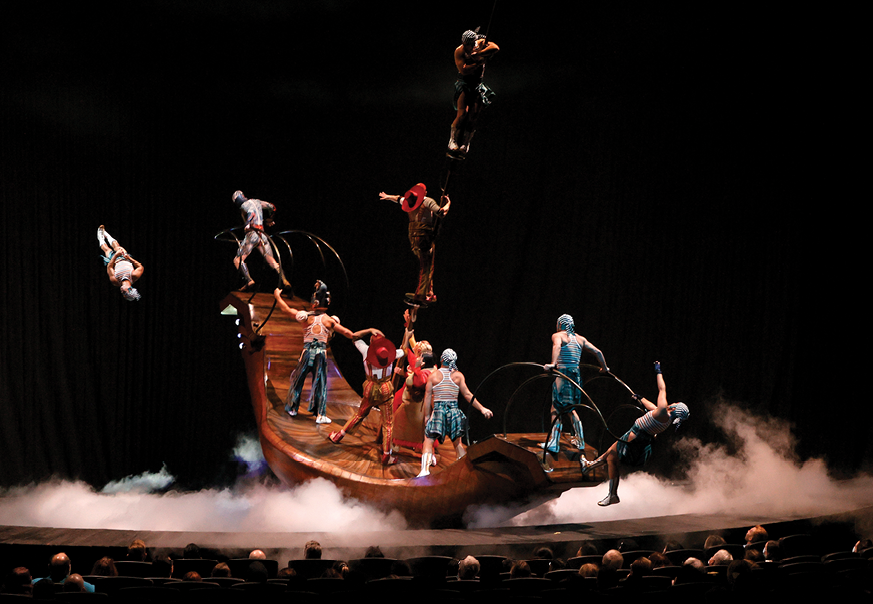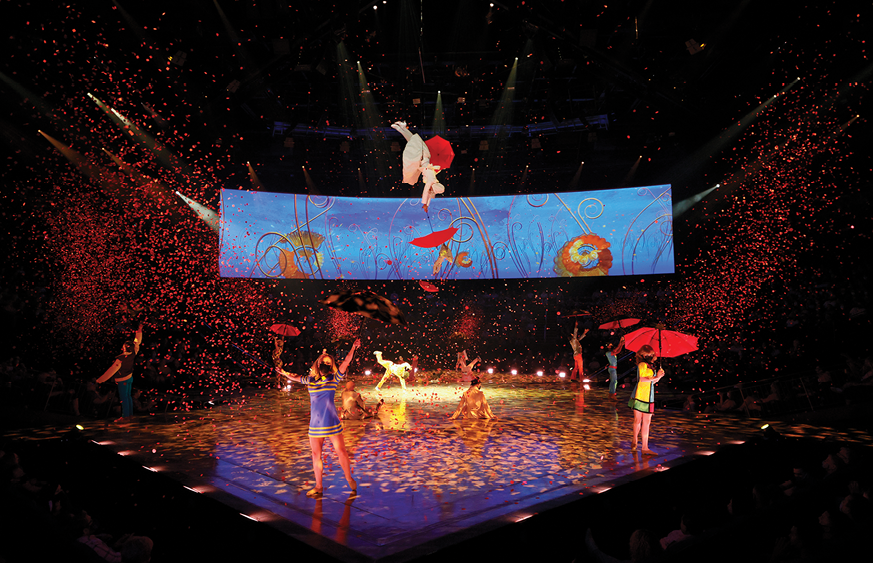- Home
- Media Kit
- MediaJet
- Current Issue
- Past Issues
- Ad Specs-Submission
- Ad Print Settings
- Reprints (PDF)
- Photo Specifications (PDF)
- Contact Us
![]()
ONLINE
![]()
ONLINE

Creativity and Art
Editors’ Note
Daniel Lamarre is a French Canadian whose talent for leading creative companies became evident during his two decades at Cirque du Soleil. As President and Chief Executive Officer, and now Executive Vice-Chairman of the Board, he guided the organization through a period of astounding growth and then brought it back to life during the massive upheaval of the COVID-19 pandemic. When Lamarre joined in 2001 as president of new ventures, Cirque du Soleil had 2,000 employees and seven shows in performance. Five years later, he became Chief Executive and the company grew to 5,000 employees and 44 shows around the world (including recent subsidiary acquisitions). At its peak, Cirque du Soleil had annual sales of $1 billion, profit margins of 20 (EBITDA), and 15 million people attending its shows per year, more than all 39 Broadway shows combined. Before coming to Cirque du Soleil, Lamarre was President and CEO of the TVA Group, Inc., Canada’s largest television network. Previously, he was senior partner at National Public Relations, Inc. His first major job came in 1981, at the age of 28, when he founded and directed the Montreal office of the world’s largest PR firm, Burson-Marsteller. In 2012, he cofounded the C2 Montreal conference, a one-of-a-kind gathering of the world’s creative and business elite. Lamarre has been honored with doctorates from the Faculty of Law at McGill University; the University of Quebec in Trois-Rivières; and the Faculty of Arts at his alma mater, the University of Ottawa. Concerned about education and health and welfare issues, he supports a variety of charities. Lamarre has been involved with Cirque du Monde, a worldwide social circus program that targets at-risk youth; the One Drop Foundation that Cirque founder, Guy Laliberté, created to provide healthy drinking water to underprivileged nations; and the Montreal Heart Institute Foundation, for which he serves as Chairman of the Board of Directors.
Company Brief
Cirque du Soleil Entertainment Group (cdsentertainmentgroup.com) is a world leader in live entertainment. On top of producing world-renowned circus arts shows, the Canadian organization brings its creative approach to a large variety of entertainment forms such as multimedia productions, immersive experiences, theme parks and special events. Going beyond its various creations, Cirque du Soleil Entertainment Group aims to make a positive impact on people, communities and the planet with its most important tools: creativity and art.

Cast members perform during the grand reopening of
“KÀ by Cirque du Soleil” at MGM Grand Hotel & Casino
on November 24, 2021 in Las Vegas
Will you highlight the history and heritage of Cirque du Soleil and how Cirque du Soleil has evolved?
Cirque was founded in 1984 by Guy Laliberté and a ragtag group of street performers in Québec who wanted to change the world – and they did, by inventing a new kind of circus. Their first big break came when the government funded a 13-week tour to celebrate the 450th anniversary of French explorer Jacques Cartier’s voyage to Canada. Since then, Cirque du Soleil has evolved into a completely original art form with elements of circus, drama, comedy, dance, performance art, live musical concerts and high-tech stagecraft, accessible in any language or culture. And it became a big business, growing to $1 billion in revenue, pre-pandemic.
What have been the keys to Cirque du Soleil’s ability to stay current and relevant?
When people ask me what keeps me up at night, I say, “Imagining someone else at the top of our industry.” To keep our leadership position, we never forget our founders’ total commitment to creativity. We hire directors who will push the boundaries of what is possible and cast performers who are the best in the world and fearless in trying new approaches. We are always on the lookout for fresh ideas in areas like music, fashion, architecture, theater, film and computer games and constantly hunting for innovations in technology and science that are ready for practical application. When you see something spectacular at a Cirque show that you have never seen before, it’s because of that spirit of restless searching.
How do you define Cirque du Soleil’s purpose and mission?
Our mission statement says it well: “Invoke the imagination, provoke the senses and evoke the emotions” of people around the world. But our commitment goes beyond the performance. We aim to positively impact peoples’ lives, communities and the planet with what we know and do best: creativity and art.
.png)
Will you discuss the conviction that the arts and business, together, can contribute to making a better world and how this concept is at the foundation of Cirque du Soleil?
The astonishing feats on our stages remind the world that anything is possible, and the success of our company as a business shows how to successfully fuse the creative and the practical, the dreaming and the bill paying. That’s a big theme of my book, Balancing Acts. Also, we have a set of rules called The Four Criteria that we use to choose our next projects and partners. One is, “Are Our Partners Socially Engaged?” If the answer is no, we introduce them to causes like Cirque du Monde or One Drop which are nonprofit organizations we support.
How did Cirque du Soleil adapt its business to address the challenges caused by the pandemic and how is Cirque du Soleil positioned for future success?
In March of 2020, we had to shut down our 44 shows around the world in the span of 48 hours. Revenue dropped to zero, forcing us to go through a painful period of bankruptcy protection and laying off 95 percent of our employees. Then, all over sudden, I began fielding calls from important investors attracted by the strength of our brand and the high value of our intellectual property. Within a few months, we were acquired by our creditors who refinanced our debt and invested an additional $375 million. That set us up to make a dramatic relaunch of our Las Vegas shows last summer. Today, we continue to gradually reopen our productions, have begun developing new shows, and see great capacity to grow across the globe.
How proud are you to see the resilience of Cirque du Soleil’s workforce during this challenging and unprecedented time?
After the relaunch of our Las Vegas water show, “O,” I gave a socially distanced toast to the cast and crew and choked up as I tried to explain just how grateful I was. It was incredible that the clear majority of our artists continued to train during the pandemic, stayed in shape and ultimately came back to perform. They never gave up. Same with crew members and other employees who believe in our mission so deeply that they returned to get our shows back up. I will never forget their resiliency and courage.

Cast members perform during the grand reopening of
“The Beatles LOVE By Cirque du Soleil” at
The Mirage Hotel & Casino on August 26, 2021 in Las Vegas
You mentioned your book, Balancing Acts: Unleashing the Power of Creativity in Your Life and Work. What interested you in writing the book and what are the key messages you wanted to convey in the book?
When I joined the circus in 2001, I was a conventional businessman. Over the next two decades, my experience at Cirque so completely transformed my approach to business and life that I wanted to share what I had learned. My message is that creativity is not just for the chosen few, it’s for everybody and it’s essential to thrive in today’s hyper-connected global economy. Whether you are an entrepreneur, an executive or a professional, if you are not prioritizing creativity – in the dictionary definition of “making or bringing into existence something new” – you are wasting your time. No company deserves to exist unless it is constantly discovering new ways to make its customers’ lives better. Without creativity, there is no business.
What do you see as the keys to effective leadership and how do you describe your management style?
Running a global live entertainment company means being in a constant state of alert, ready for anything. When times are tough, I become what I would call a “cool fighter.” I say “cool” because I rarely lose my temper. The more pressure there is, the more focused I get. And “fighter” because I never give up. I am not an aggressive person, but I am tenacious. I never lose track of the final goal, whether it’s the marathon negotiations for music rights for “The Beatles LOVE” show or bringing our company back from the pandemic. I know I’m not a particularly charismatic leader. My actions are more compelling than my words. In times of crisis, there is no time for grandstanding or self-pity. Effective action is what matters.
With all of the success that Cirque du Soleil has achieved, do you take moments to reflect and celebrate what Cirque has accomplished?
When I arrived, the consensus within the company was that we had saturated the market with our seven shows. That makes me chuckle now. Creativity was so deeply embedded into our DNA that our artists couldn’t help but dream big, launching new shows, one after another, with audacious concepts – the moving stage of “KÀ” from acclaimed director Robert LePage; “The Beatles LOVE;” “Toruk – The First Flight,” based on James Cameron’s Avatar, and much more. Over the next two decades, we grew more than sixfold to 44 shows (including acquisitions), with annual revenues doubling from $500 million to $1 billion. Today, more than 365 million spectators have seen our productions around the world.
When I recently transitioned from CEO to Executive Vice-Chairman of the Board, I did take some time to look back at Cirque’s accomplishments with pride and gratitude to our artists who made it all possible. As I remain involved, offering support to new CEO Stéphane Lefebvre and his team, our goal remains the same: To remain the biggest and greatest live entertainment company in the world.![]()